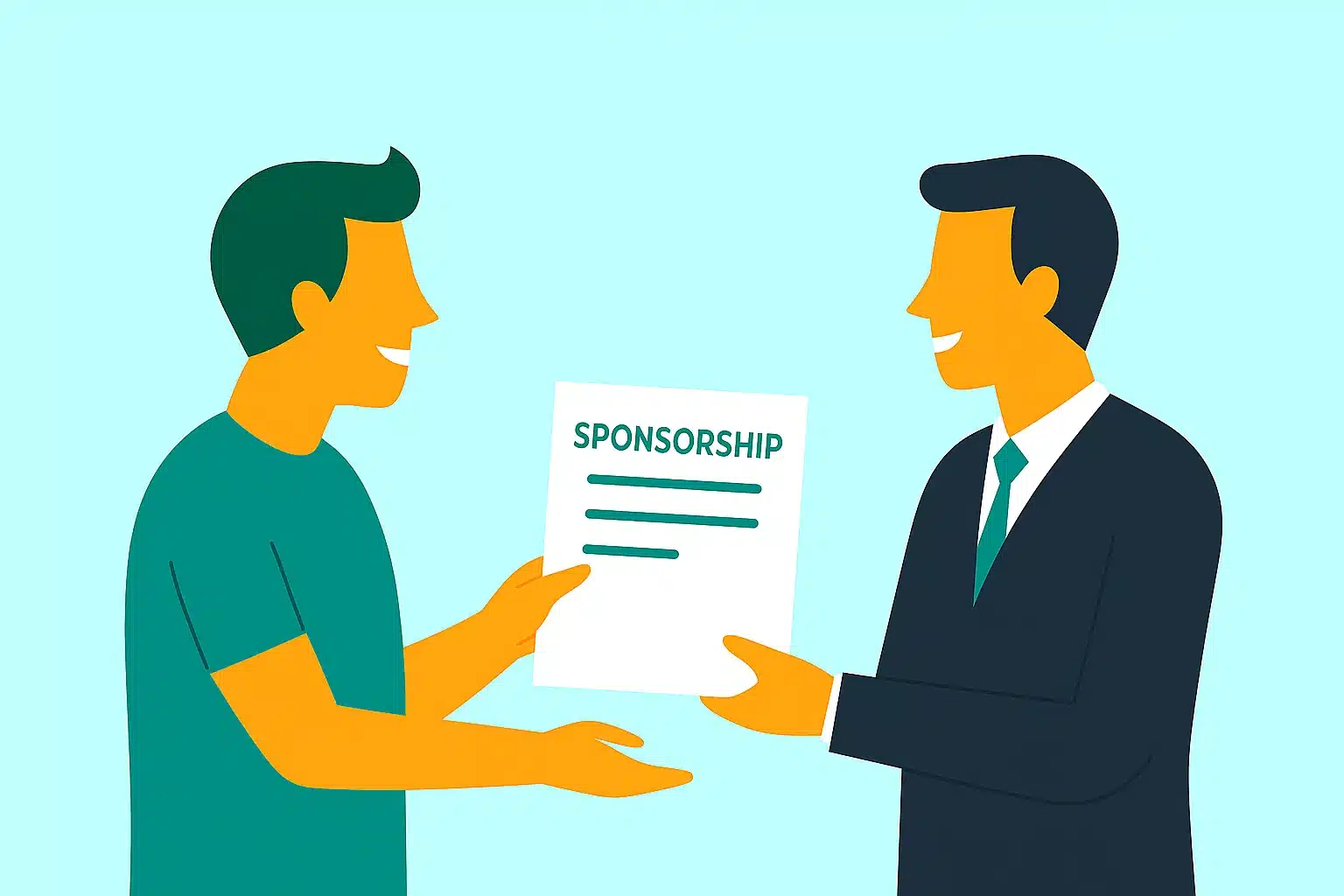Sponsorship Agreement Example: How to Create a Professional Contract with Template

A sponsorship agreement defines the relationship between an organization and a sponsor. Whether you’re organizing a sports event, music festival, or community initiative, a well-drafted sponsorship agreement ensures both parties know exactly what to expect.
Without a written contract, even small misunderstandings — about payments, visibility, or the duration of the deal — can lead to costly disputes.
In this article, you’ll find everything you need to know about how to write a sponsorship agreement, what essential clauses to include, and a complete sponsorship agreement example you can download or adapt for your own use. All of this comes standard with Sponsorvista.
Create your sponsorship contract in minutes — and manage everything in one place.
Sign up for free to create professional sponsorship contracts, send invoices automatically, and keep all your agreements neatly organized in one system.
Stay in control of your sponsorships from contract to payment.
What Is a Sponsorship Agreement?
A sponsorship agreement is a legal contract between a sponsor (the company providing financial or in-kind support) and an organizer (the event, club, or organization receiving it).
It specifies:
- What each party provides
- What benefits are offered in return
- How long the agreement lasts
- How payments and brand exposure are managed
A clear agreement helps both sides protect their interests and maintain a professional partnership.
Why You Need a Sponsorship Agreement
A written sponsorship agreement provides legal clarity and professional structure. It:
- Defines what exactly is being sponsored (money, products, or services)
- Outlines what the sponsor receives (visibility, access, naming rights, etc.)
- Sets deadlines and renewal terms
- Protects intellectual property and brand reputation
- Minimizes risk if the event is canceled or delayed
Without it, you rely on verbal promises or email threads — which are difficult to enforce if something goes wrong.
Key Clauses in a Sponsorship Agreement
Here are the main elements every event sponsorship contract should include.
1. Parties and Purpose
Clearly identify both parties (company and organization) with names, addresses, and contacts.
Explain the purpose: e.g., sponsorship of a specific event or campaign.
2. Term and Renewal
Define the start and end date.
If you want an ongoing relationship, include an automatic renewal clause — for instance, the contract renews for one year unless terminated 60 days before the end date.
3. Sponsorship Contribution
Describe what the sponsor provides:
- Financial support (e.g., $10,000)
- Products or services (in-kind support)
- A combination of both
Include how and when payment occurs, and whether any taxes or transfer costs apply.
4. Organizer Obligations
List what the organizer must deliver:
- Placement of sponsor logo (banners, social media, print, website)
- Mentions in press releases or on stage
- VIP tickets or access for the sponsor’s guests
- Proof of performance (photos, reports, or exposure metrics)
5. Sponsor Obligations
The sponsor must:
- Deliver logos, materials, and payment on time
- Approve the use of brand assets
- Respect deadlines for campaigns or co-promotions
6. Intellectual Property
The sponsor retains ownership of all trademarks and logos.
The organizer receives a limited, non-exclusive license to use these solely for the duration of the event.
7. Exclusivity
If agreed, specify the sponsor’s exclusive category (e.g., “exclusive beverage sponsor”).
Clarify the scope and duration of exclusivity to avoid future disputes.
8. Reporting and Transparency
State how the organizer will report performance to the sponsor — e.g., exposure results, media reach, or attendance figures.
9. Event Cancellation or Postponement
If the event is canceled or rescheduled, the agreement should describe how payments are refunded or rescheduled proportionally.
10. Liability and Reputation
Limit liability to the value of the sponsorship, except in cases of gross negligence or intent.
Include a morality clause, allowing termination if one party damages the other’s reputation.
11. Confidentiality and Data Protection
Both parties must handle shared data confidentially and comply with applicable privacy laws (like GDPR).
12. Governing Law and Dispute Resolution
Choose the applicable law (e.g., Dutch law, English law) and specify the competent court or arbitration method for resolving disputes.
When to Seek Legal Review
For small local sponsorships, a simple agreement like the one below often suffices.
However, for high-value or international deals, consider having a lawyer review your contract. They can help refine:
- Limitation of liability
- Intellectual property clauses
- Dispute resolution terms
- Compliance with local regulations
Sample Sponsorship Agreement Example
Below is a professional sponsorship agreement example you can use as a starting point. It’s designed for flexibility — suitable for events, sports clubs, cultural projects, or brand partnerships.
Sponsorship Agreement
Between [Sponsor Name] and [Organization Name]
1. Parties
Sponsor: [Company name, address, contact person, email] Organization: [Name of event organizer, address, contact person, email]
Together referred to as the “Parties” and individually as a “Party.”
2. Purpose
This agreement defines the sponsorship arrangement between the Sponsor and the Organization regarding [event or activity name], including mutual obligations, benefits, and terms.
3. Term and Automatic Renewal
- This agreement begins on [start date] and ends on [end date].
- Unless either Party gives written notice of termination at least [60 days] prior to the end date, the agreement shall automatically renew for one (1) additional year under the same terms.
- Any changes or extensions must be confirmed in writing.
4. Sponsorship and Payment
- The Sponsor contributes [amount and currency] or provides [goods/services/combination] with an equivalent market value.
- Payment shall follow the agreed schedule.
- Additional expenses such as transport or setup costs are only covered if agreed in writing.
5. Organizer Obligations
The Organization shall:
- Deliver the agreed sponsor benefits listed in Schedule A (e.g., logo placement, promotional mentions, access to the event).
- Provide updates and performance evidence (photos, attendance figures, or media reports).
- Use the Sponsor’s logo and name only as approved under this agreement.
6. Sponsor Obligations
The Sponsor shall:
- Provide payment and materials in line with agreed deadlines.
- Deliver all artwork and brand assets in the required format.
- Authorize the Organizer to use the Sponsor’s brand within the agreed scope and time frame.
7. Intellectual Property
- The Sponsor retains ownership of all trademarks and promotional materials.
- The Organizer receives a temporary, non-transferable license to use these solely for purposes of the event.
- All use of the Sponsor’s brand ends once the agreement expires, unless otherwise agreed in writing.
8. Exclusivity
If exclusivity is granted, the Organizer agrees not to engage other sponsors within the same product or service category for the duration of this agreement.
The category and scope of exclusivity are defined in Schedule A.
9. Reporting
The Organizer shall maintain internal records of all sponsorship deliverables and provide a summary report upon the Sponsor’s request.
10. Event Cancellation or Change
If the event is canceled, postponed, or materially altered, the Parties shall negotiate a reasonable adjustment or partial refund of the sponsorship fee.
11. Liability
- Each Party is responsible for its own actions and obligations.
- Neither Party shall be liable for indirect or consequential damages.
- Total liability is limited to the total sponsorship amount, except in cases of gross negligence or willful misconduct.
12. Morality and Reputation
If either Party engages in conduct that seriously damages the reputation of the other, the affected Party may terminate the agreement immediately without refund.
13. Confidentiality and Privacy
All confidential information shared between Parties must be kept strictly confidential.
Personal data will be processed in accordance with applicable data protection laws (e.g., GDPR).
14. Force Majeure
Neither Party shall be held liable for non-performance caused by events beyond their reasonable control, including natural disasters, war, pandemics, or government restrictions.
15. Termination
Either Party may terminate this agreement:
- In case of a material breach not remedied within a reasonable period after written notice;
- By mutual written consent;
- In circumstances described under Clause 12 (Reputation) or Clause 14 (Force Majeure).
Outstanding payments remain due unless otherwise agreed.
16. Governing Law
This agreement shall be governed by and construed in accordance with the laws of [country].
Disputes shall be submitted to the competent court in [city], unless Parties agree to arbitration or mediation.
17. Signatures
This agreement takes effect upon signature by both Parties.
Electronic signatures are legally binding.
Each Party retains one signed copy for its records.
Schedule A – Sponsor Benefits
- Logo placement on website, banners, or event materials
- Mentions in press releases and social media posts
- Access to [number] tickets or VIP passes
- Exclusive sponsorship rights within [category]
- Other specific deliverables: [insert details]
Final Thoughts on This Sponsorship Agreement Example
This sponsorship agreement example is a strong and flexible foundation for most event or partnership sponsorships.
It balances legal protection with practical clarity — ensuring both parties understand their commitments.
For large-scale or international deals, you should always have a lawyer review the final version, especially if exclusivity, intellectual property, or reputation clauses are involved.
Use this sample sponsorship agreement as your starting point, tailor it to your event, and you’ll establish a professional framework for a long-term, successful partnership.
Managing Your Sponsorship Agreements Efficiently
Once you’ve created a solid sponsorship agreement example, it’s just as important to store and manage it properly. Losing track of signed contracts, invoices, or communication history can quickly lead to confusion — especially when working with multiple sponsors or long-term partnerships.
That’s why many organizations use Sponsorvista to centralize their sponsorship management. With Sponsorvista, you can store all your sponsor agreements, invoices, deal details, and contact history in one secure place. It keeps your entire sponsorship process transparent, organized, and accessible for your whole team.
Whether you’re handling one event or managing dozens of sponsor relationships throughout the year, having a single system to track every contract and invoice makes the process far more efficient.
In short: a strong sponsorship agreement is the foundation — but a professional tool like Sponsorvista makes it truly effortless to manage and maintain.




